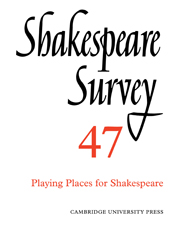Book contents
- Frontmatter
- Shakespeare Played Small: Three Speculations about the Body
- The Architecture of the Fortune Playhouse
- The Bare Island
- ‘How Chances it they Travel?’ Provincial Touring, Playing Places, and the King’s Men
- Writing for the Metropolis: Illegitimate Performances of Shakespeare in Early Nineteenth-Century London
- The Perishable Body of the Unpoetic: A. C. Bradley Performs Othello
- Playing Places for Shakespeare: The Maddermarket Theatre, Norwich
- ‘A Fairly Average Sort of Place’: Shakespeare in Northampton, 1927–1987
- The Living Monument: Self and Stage in the Criticism and Scholarship of M. C. Bradbrook
- Stratford Stages: Interviews with Michael Reardon and Tim Furby, and Sam Mendes
- Dis-Covering the Female Body: Erotic Exploration in Elizabethan Poetry
- Theseus’ Shadows in A Midsummer Night’s Dream
- ‘Time for Such a Word’: Verbal Echoing in Macbeth
- Shakespeare’s Knowledge of Italian
- Tamburline and Edward Alleyn’s Ring
- Shakespeare Performances in England, 1992–1993
- Professional Shakespeare Productions in the British Isles, January-December 1992
- The Year's Contributions to Shakespeare Studies 1 Critical Studies
- 2 Shakespeare’s Life, Times, and Stage
- 3 Editions and Textual Studies
- Books Received
- Index
The Living Monument: Self and Stage in the Criticism and Scholarship of M. C. Bradbrook
Published online by Cambridge University Press: 28 March 2007
- Frontmatter
- Shakespeare Played Small: Three Speculations about the Body
- The Architecture of the Fortune Playhouse
- The Bare Island
- ‘How Chances it they Travel?’ Provincial Touring, Playing Places, and the King’s Men
- Writing for the Metropolis: Illegitimate Performances of Shakespeare in Early Nineteenth-Century London
- The Perishable Body of the Unpoetic: A. C. Bradley Performs Othello
- Playing Places for Shakespeare: The Maddermarket Theatre, Norwich
- ‘A Fairly Average Sort of Place’: Shakespeare in Northampton, 1927–1987
- The Living Monument: Self and Stage in the Criticism and Scholarship of M. C. Bradbrook
- Stratford Stages: Interviews with Michael Reardon and Tim Furby, and Sam Mendes
- Dis-Covering the Female Body: Erotic Exploration in Elizabethan Poetry
- Theseus’ Shadows in A Midsummer Night’s Dream
- ‘Time for Such a Word’: Verbal Echoing in Macbeth
- Shakespeare’s Knowledge of Italian
- Tamburline and Edward Alleyn’s Ring
- Shakespeare Performances in England, 1992–1993
- Professional Shakespeare Productions in the British Isles, January-December 1992
- The Year's Contributions to Shakespeare Studies 1 Critical Studies
- 2 Shakespeare’s Life, Times, and Stage
- 3 Editions and Textual Studies
- Books Received
- Index
Summary
“Elizabethan drama”, Muriel Bradbrook wrote in 1962, “was . . . an embodied art, and existed for performance. To treat it as book art is to do it great violence.” The belief that interpretation of Elizabethan theatre must derive from an informed and flexible sense of its staging remained central to Bradbrook's writing throughout a long career, until her death in June 1993. A discussion of her criticism of Shakespeare and the Elizabethan drama, the main but by no means the exclusive focus of her scholarly work, together with some account of its personal origins, will serve as implicit commentary on developments in critical practice and theatre performance over the last sixty years.
Muriel Bradbrook's first published book (out of an eventual total of more than twenty) was her Harness Prize Essay of 1931, Elizabethan Stage Conditions. The work of a Cambridge graduate student of twenty-two, the book exhibits at the outset the essential characteristics, and charts the essential convictions, that mark her work throughout. With, for a novice, extraordinary imperturbability Bradbrook runs through the critics of the past and finds them wanting as commentators on Shakespeare's stage. Hazlitt, for example, 'though he was interested in the virtuosity of the actor' failed as critic due to his general mistrust of theatre; Coleridge, on the other hand, won't do because 'his historical knowledge was neither detailed nor extensive'. Such limitations are for Bradbrook significant and symptomatic.
- Type
- Chapter
- Information
- Shakespeare Survey , pp. 107 - 116Publisher: Cambridge University PressPrint publication year: 1994



